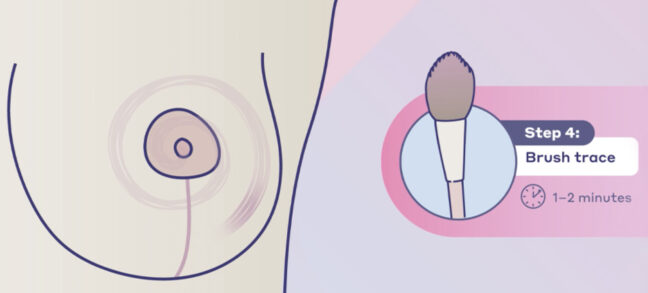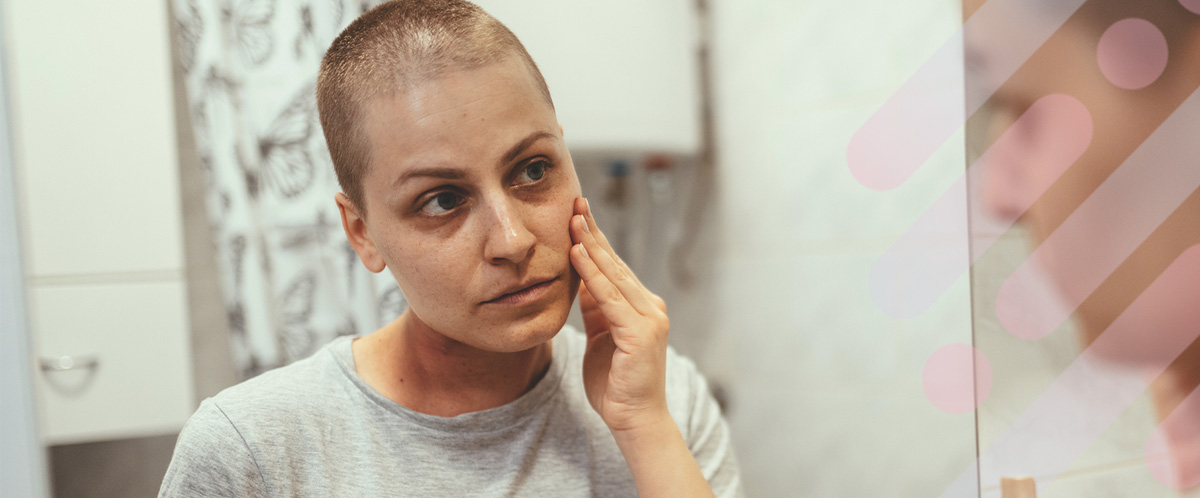It’s normal to need time to get used to your body after breast cancer treatment. Whether you had a mastectomy, surgery, chemotherapy or other treatments, your body may look and feel different than before. You may feel self-conscious or unsure. This is okay.
body image and sexuality
How you see and feel about your body affects not only your physical health, but mental and emotional as well. After breast cancer treatment, you may be dealing with new scars, a mastectomy, hair loss, changes in sexual functioning, weight changes or menopause. According to a study, more than half of all cancer patients struggle with body image at some point in their cancer journey.
body image
It’s normal to need time to adjust to your body’s changes. You may want to avoid looking at these changes, but confronting them early will help you in the long term.
Tips for working toward positive self-image:
- Adjusting to a changed body takes time, so be patient and kind with yourself.
- Talk to others who have had similar experiences, and in general, surround yourself with friends and family who help you feel good and can help you with day-to-day tasks.
- Talk to your health care team about options for hair loss, reconstructive surgery and other cosmetic solutions.
- Stay active as much as you are able. Physical activity can help you feel more energetic and give you something positive to focus on
- Wherever possible, find ways to laugh. Humor can help you relax during times of stress.
The more you look at your body, the more normal it will begin to seem. Over time, the intense emotions you may feel when seeing your changed body will likely lessen, especially if you take time to practice acts of self-assurance and care.
sex and intimacy
The medical side effects of cancer treatment may affect sexual functioning—as can the psychological stress of cancer. It’s common for couples to put their bedroom life on pause during treatment, but cancer does not mean the end of your intimacy together (or with a future partner if you are single). Many cancer survivors say they were not prepared for the changes in their sex lives.
It’s important to talk openly with your partner about your physical and emotional intimacy needs and desires. These conversations may feel awkward or uncomfortable, but many couples find the process of rediscovering new paths to sexual satisfaction to be rewarding.
physical changes you may experience during or after treatment
hair loss
Hair loss is one of the most recognizable physical symbols of cancer, so it’s understandable that losing hair may feel especially distressing.
You can expect to notice hair loss one to three weeks after starting treatment. Depending on your type of chemotherapy and/or radiation therapy, you might only lose hair on your head, or you might notice thinning or loss of hair on your eyebrows, eyelashes, arms, legs and pubic area. Your scalp might also feel sensitive.
Dealing with hair loss is a personal choice. Some women feel most comfortable finding a wig that matches their pre-cancer style—or even trying out a new style. Others prefer a scarf, hat or no covering at all.
lymphedema
When lymph nodes are removed during cancer treatment surgery, there’s a chance of developing lymphedema, or a buildup of lymph fluid in the body. The resulting swelling commonly occurs in the chest, neck and underarm area after breast cancer surgery.
In some cases, women will wear a lymphedema sleeve to help with circulation. These compression sleeves come in a variety of styles, which may affect the way you want to dress.
menopause
Many women experience menopause because of breast cancer treatment. These symptoms can include:
- Hot flashes and night sweats
- Vaginal dryness
- Changes in your sexual desire and the way you experience orgasm
- Weight gain
post-mastectomy options
Most women can return to normal activities six to eight weeks after a mastectomy, but it may take as long as two years for tissues to fully heal and for scars to fade somewhat.
For some women, breast reconstruction can help them feel more confident after mastectomy. You may feel numb after the procedure. With Resensation®, you have the opportunity to not only look—but potentially feel—more like yourself again. This surgical technique has the potential to restore sensation to your breast as part of breast reconstruction.
Another option is a breast prothesis, or a prosthesis that fits inside a bra cup. This can be a temporary or permanent option.
You may also choose to leave your body as-is after a mastectomy, without a reconstruction or prosthesis. Neither are required—you are free to choose the option that helps you feel most comfortable.
resources:
- If you are having trouble working through your emotions about your changed body on your own—or with a partner—you may find it useful to seek help from a mental health professional or counselor.
- There are different kinds of support groups that offer support in different ways. Try to find a group that works best for your needs.
- Breast cancer worksheet: Speaking to your partner about sex and intimacy
Some links will navigate you away from the Resensation® website. Links outside of resensation.com are provided as a resource to the viewer, and do not constitute an endorsement or recommendation by Axogen. Axogen accepts no responsibility for or control over the content of the linked sites.
Resensation Articles

How does mastectomy impact the nerves in the breast?
One sometimes overlooked aspect of mastectomy is its impact on nerves. Read what happens to nerves during mastectomy and explore…
Read More
What happens during implant breast reconstruction with Resensation®?
By repairing sensory nerves, Resensation® enables you to potentially regain sensation to your chest. Read how this procedure works during…
Read More
how resensation® helped Leanna feel secure in her family’s future
With Resensation®, Leanna can be there to watch her kids grow up—without losing the feeling of being whole.
Read More
post-surgery sensory retraining: instructions and video guide
Sensory retraining is a series of exercises designed to help you reconnect with your body after breast reconstruction with Resensation®.
Read More